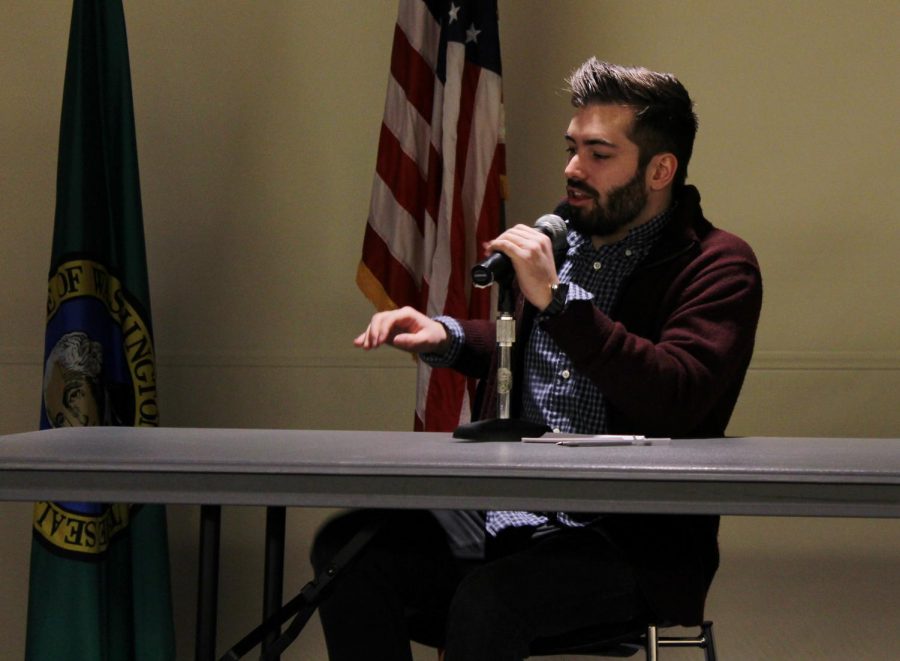Political clubs argue gun rights, debate healthcare
College Republicans, Young Democrats debate regulations
Abby Tutor | The Daily Evergreen
Member of the College Republicans, Stuart Walsh, argued that a national concealed carry permit, which students on campus could use, could overcome mass shootings.
November 29, 2017
In their first debate of the semester, WSU Young Democrats and College Republicans went head-to-head on healthcare, renewable energy, tax reform, the opioid crisis and gun control Tuesday night.
Quinton Berkompas opened the discussion for the Young Democrats, saying the current healthcare system in the U.S. is failing and that Obamacare was the start to solving its problems.
“Doctors order tests and prescriptions, not because it’s best for the patient,” he said, “but, that it’s how they make a profit. It’s time for us to realize that healthcare is a human right, and it’s not about profit and profiting off diseases that kill Americans every day.”
The College Republicans suggested taking a different approach. Ryan Moore said the country should let the free market decide.
“With many different competitors competing,” he said, “premiums would decrease as different providers compete to provide lower prices and better care for everyone.”
Moore said healthcare was a necessity, but not a human right.
The primary argument between the parties was over the source of the funding for universal healthcare.
Moving onto climate change, Cyrus Khorram of the College Republicans said the government should not directly intervene but instead push the private industry to make the transition to alternative energy in the U.S.
The Young Democrats disagreed, with President Gavin Pielow rebutting.
“[The role of the government in the transition to alternative energy] is to stay in the Paris agreement,” he said, “and to incentivize it, and to not enslave ourselves to the oil and natural gas industry.”
Khorram opened the discussion on tax reform for the College Republicans. He said the current system is not working and that businesses are using a multitude of loopholes to evade paying taxes.
“People shouldn’t have to go to H&R Block to pay their taxes,” he said.
Pielow agreed, but also said the suggested bill by the Republicans in Congress was not the answer.
“Tuition waivers will now be taxable income,” Pielow said. “If you are a graduate student … or a student that receives a waiver for low income families, that is now taxable, too. You are damaging our education.”
The fourth topic of the night was the war on drugs, and specifically the current opioid epidemic crisis.
Amir Rezamand, president of the College Republicans, said the drugs people think they are buying, like OxyContin, are not actually those substances. Instead they are a mix of drugs, including heroin.
The Republicans added that building the southern border wall would combat the opioid crisis, as most of the drugs entering into the U.S. come from there.
Duncan Thomson of the Young Democrats disagreed, saying a southern border wall wouldn’t eliminate illegal drug smuggling. He said the taxes being collected to build the wall could be used instead to treat addiction.
Cassidy Cunningham elaborated further for the Young Democrats, saying rehabilitation should be the focus instead.
“Addiction is treated as a crime,” she said, “instead of as the disease it is. We need to be putting people in rehabilitation centers, instead of prisons.”
The debate ended on gun control and the safety measures the government should or should not take to prevent gun violence.
Speaking for the Young Democrats, Evergreen columnist Mohamed Salem said rewording the Second Amendment is essential, and limiting the types of guns citizens can own would prevent future incidents.
Berkompas agreed with his party mate, adding that though guns are a part of U.S. culture and aren’t going anywhere, they can be regulated to ensure safety.
The College Republicans rebutted Berkompas, with Stuart Walsh arguing that background checks continue to ensure citizen safety. He suggested a national concealed carry permit or student campus carry permits as ways to overcome mass shootings.
The debated ended with a Q&A session with both parties answering questions from the audience.
“I thought [the debate] went well, informative, civil and the students here learned something,” said Foley Institute Director Cornell Clayton, who moderated. “We should have more events like this one.”






















